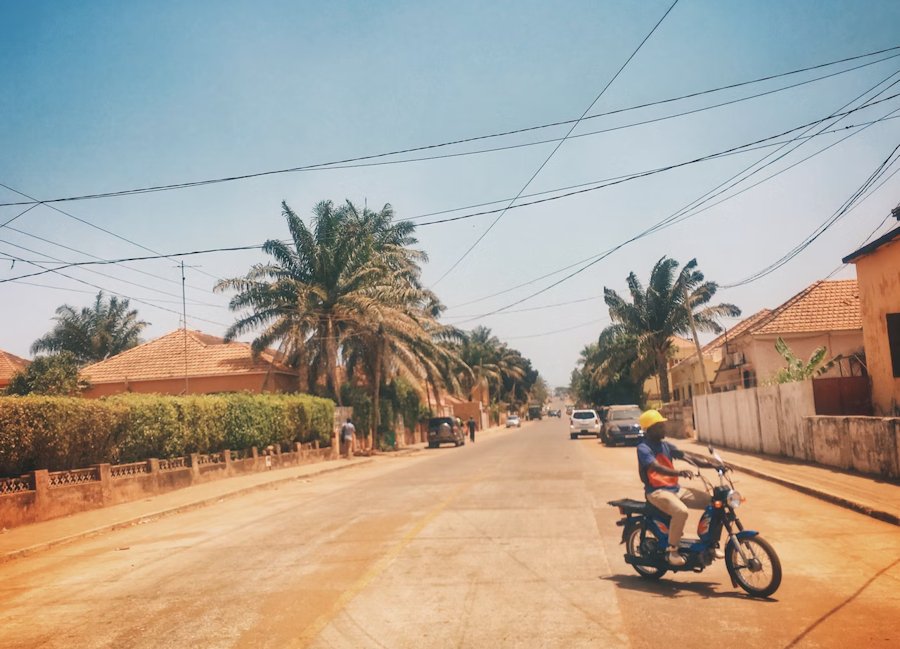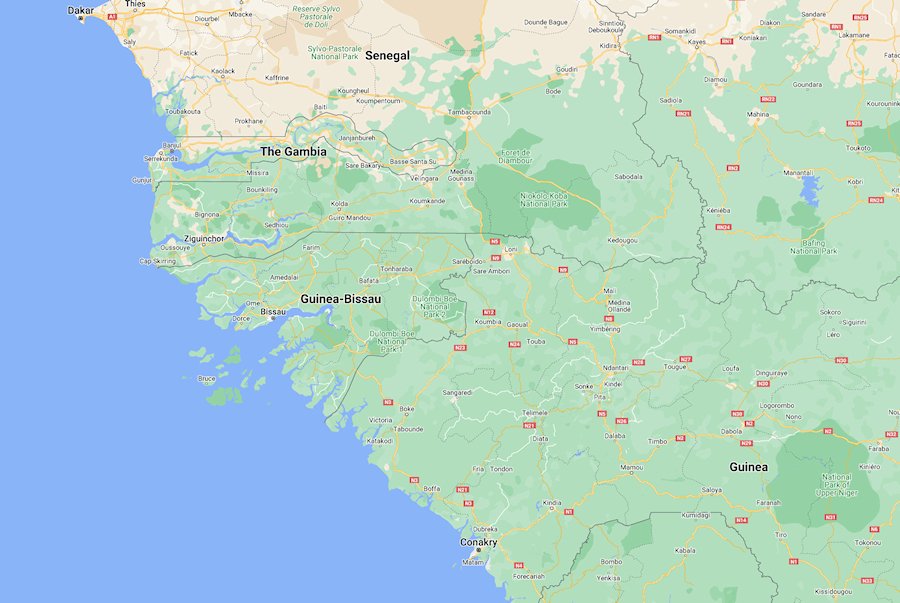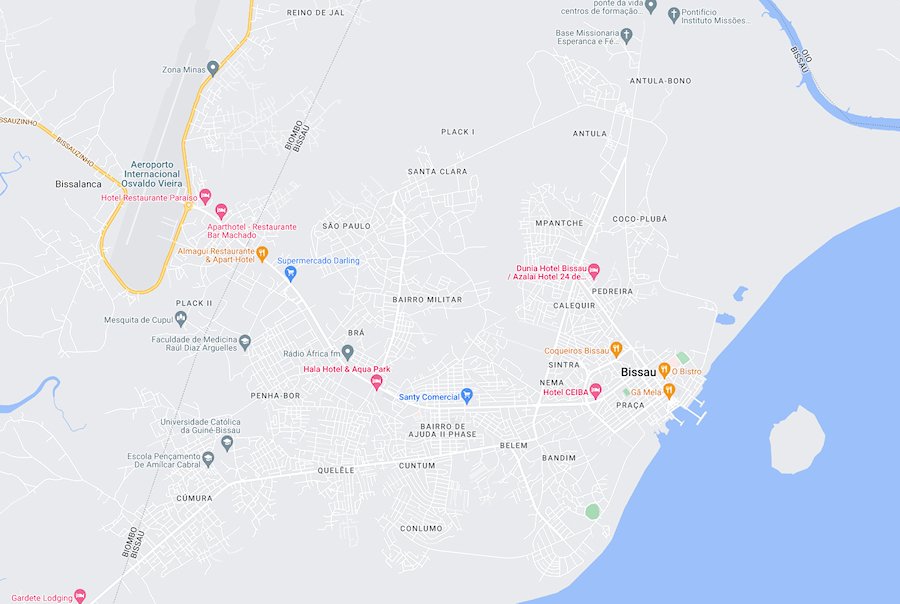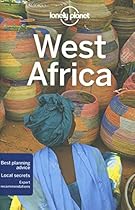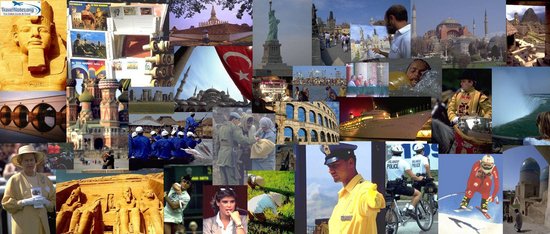Travel Notes: Africa - Guinea-Bissau Travel Notes.
Short URL: https://tnot.es/GW
Guinea-Bissau Travel and Tourism on Travel Notes
Wild Adventures Await - Explore Guinea-Bissau's National Parks
Embark on nature excursions in Guinea-Bissau's pristine national parks. Encounter rare species, breathtaking landscapes, and unforgettable moments. Share on Facebook
About Guinea-Bissau
An off-the-beaten-path destination on the west coast of Africa, Guinea-Bissau can be a rewarding destination for adventurous travellers looking to explore a unique and largely undiscovered corner of Africa.
Guinea-Bissau is sandwiched between Guinea and Senegal and encompasses some 60 offshore islands; including the Bijagos Islands.
 Add a Business -
Add a Location -
Add a Lodging - Add Travel Content
- Add URL
- Travel Services.
Add a Business -
Add a Location -
Add a Lodging - Add Travel Content
- Add URL
- Travel Services.
Mapping Guinea-Bissau
Map of Guinea-Bissau
Guinea-Bissau is a small country located in West Africa bordered by Senegal to the north and Guinea to the south and east, with a long coastline on the Atlantic Ocean to the west.
The capital of Guinea-Bissau is Bissau.
Guinea-Bissau Country Information
Guinea-Bissau is mainly low-lying and swampy with many large estuaries.
The capital, Bissau, is located on one such estuary - near the mouth of the Geba River - in the middle of Guinea-Bissau's Atlantic coastline.
Brief History
Nuno Tristao, a Portuguese slave trader, visited the area in 1446, but a Portuguese trading post wasn't established at Bissau until 1687.
The British briefly had a settlement at Bolama in the late 18th century.
Portugal had their land claims disputed by the French and British; and couldn't establish sufficient control over Guinea Bissau, until 1915.
Economy
The economy of Guinea-Bissau is largely dependent on agriculture, with rice and cashews being the two main crops.
Fishing and forestry are also important industries.
The country's economy has been hindered by corruption, poor infrastructure, and a lack of investment.
Ethnic Groups
Guinea-Bissau is known for its diverse cultures and ethnic groups, including the Balanta, Fula, and Mandinka people.
Portuguese is the official language, but many people also speak Creole and other African languages.
Independence
Guinea-Bissau gained independence in 1973; helped in part by the overthrow of the dictatorship in Portugal, during the early 1970's..
Since then, the country has struggled with political instability and economic challenges.
It has experienced multiple coups and attempted coups, as well as periods of civil war and unrest.
National Parks
The country is home to several national parks and wildlife reserves, including the Bijagos Islands and the Cantanhez Forest National Park.
Population
Guinea-Bissau has a population of around two million people.
Much work remains to be done to address poverty and promote sustainable development in this small but fascinating country.
Visiting Guinea-Bissau
Guinea-Bissau is a small country located in West Africa with a diverse culture, rich history, and beautiful natural landscapes.
Bissau
The capital city, Bissau, is a good starting point for visitors to Guinea-Bissau, where you can explore local markets, museums, and historical sites such as the Fortaleza de São José da Amura and the Presidential Palace.
Map of Bissau
Islands of Bijagos Archipelago
Guinea-Bissau has some beautiful beaches, particularly the Bijagos Archipelago, which is a group of islands located off the coast of Guinea-Bissau.
The islands are known for their pristine beaches, crystal-clear waters, and unique cultural heritage.
Where to Stay in Guinea-Bissau
In terms of accommodation, Guinea-Bissau offers a range of options including hotels, guesthouses, and campsites.
It's recommended to book accommodation in advance, especially during peak travel season.
Getting to Guinea Bissau
Guinea-Bissau can be a rewarding and memorable experience for those who are interested in exploring a unique and culturally-rich destination in West Africa.
Guinea-Bissau is serviced by Air Bissau and TAP Air Portugal. Air Mauritanie and TACV also connect Bissau with Mauritania and Cape Verde.
Bissau's Osvaldo Vieira Airport (OXB) is 8km from Bissau. If you get to the airport too early, you might find it locked.
Adventurous travellers can travel overland from Guinea or Senegal.
Getting Around Guinea-Bissau
Travelling in Guinea-Bissau can be challenging due to the country's limited infrastructure and ongoing political instability.
It's important to research travel advisories and safety information before planning a trip and to take necessary precautions while travelling in the country.
Nature and Wildlife in Guinea-Bissau
If you are interested in nature and wildlife, Guinea-Bissau has several national parks and wildlife reserves worth visiting, such as the Orango Islands National Park and the João Vieira and Poilão Marine National Park, which are home to a variety of species including chimpanzees, manatees, and sea turtles.
Embarking on nature excursions in Guinea-Bissau's pristine national parks offers a unique opportunity to connect with the natural world in a way that few other destinations can match.
The country's national parks are home to an incredible array of rare and endangered species, making each excursion a truly unforgettable experience.
As you venture into the national parks of Guinea-Bissau, you'll have the chance to encounter species that are found nowhere else on earth.
From the vibrant plumage of the African pygmy kingfisher to the elusive African forest elephant, the parks are teeming with life waiting to be discovered.
In addition to the remarkable wildlife, the landscapes of Guinea-Bissau's national parks are nothing short of breathtaking.
From lush rainforests to sweeping savannahs, each park offers a unique and awe-inspiring backdrop for your nature excursions.
Immerse yourself in the natural splendour of Guinea-Bissau by exploring the tranquil Bijagós Archipelago or the rugged beauty of the Cantanhez Forest.
These excursions are sure to provide you with unforgettable moments that will stay with you long after you've returned home.
Whether it's witnessing a family of chimpanzees swinging through the treetops or catching a glimpse of a rare African manatee in a secluded waterway, the experiences you'll have in Guinea-Bissau's national parks are sure to leave a lasting impression.
So, if you're seeking an adventure that will take you off the beaten path and into the heart of some of the most pristine and untouched natural environments on the planet, look no further than Guinea-Bissau's national parks.
With their rare species, breathtaking landscapes, and unforgettable moments, these excursions are sure to be the highlight of any nature lover's journey.
Guinea Bissau Language
A commonwealth of Portuguese-speaking countries was formed on July 17th, 1996, to preserve the Portuguese language, coordinate diplomatic efforts, and improve cooperation among its members: Angola, Brazil, Cape Verde, Guinea-Bissau, Mozambique, Portugal, and Sao Tome and Principe.
Portuguese for Travellers:
Teach yourself basic Portuguese before you travel to Cape Verde.
Guinea-Bissau Maps and Travel Guides
Travel in West Africa - West Africa Maps.
Weather in Africa:
Local weather forecasts for destinations around Africa.
|
|
More From Travel Notes
Travel Notes Online Guide to Travel
Africa - Asia - Caribbean - Europe - Middle East - North America - Oceania - South America.
The Travel Notes Online Guide to Travel helps visitors plan their trip with country and city travel guides, local tourist information, reviewed web sites, and inspiring travel content.
Travel and Tourism Guides on Travel Notes
 If you find Travel Notes useful, please take a moment to
like us on Facebook and share with your friends on social media.
If you find Travel Notes useful, please take a moment to
like us on Facebook and share with your friends on social media.
Share on Facebook
Travel Resources
.
Travel & Tourism With Industry Professionals.

